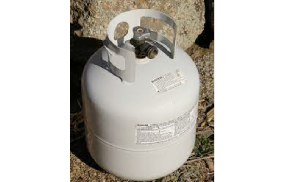Due to its combustibility and flammability, propane is practical in many different applications, such as heating homes and businesses, fueling engines, and lighting up the grill for a cookout. However, the same features that make propane extremely beneficial also make it extremely hazardous. Even when all reasonable precautions are taken, propane tanks can and do explode, causing serious injury to those nearby. That is why it is critical to understand the leading causes of propane tank explosions.
After being injured in a gas tank explosion, consulting with a gas explosion attorney should be your next step.
Can a Propane Tank Explode Easily?
Should enough pressure accumulate, the tank has the potential to detonate, propelling flames, fragments, and assorted wreckage outward. Given that propane tanks are subject to regulations and incorporate safety mechanisms to avert excessive filling, these tanks are not usually expected to explode during ordinary usage or under typical temperatures.
Safety mechanisms and devices are installed in tanks to prevent accidents, explosions, and propane tank breaches or ruptures. Just like any other dangerous activity or hazardous material, exercising good judgment is a major factor in contributing to or preventing any kind of accident.
Propane is Multi-Functional
Propane is an artificial byproduct of natural gas and oil processing, and it is extremely incendiary. It is this combustibility that allows it to be used for multiple purposes in both commercial and residential locations. It can also power things such as engines, grills, central heating systems, and torches.
The same flammable characteristic that makes propane valuable for so many different purposes can also create extensive hazards if appropriate safety protocols are not obeyed or equipment malfunctions.
What Causes Propane Tanks to Explode?
Propane is usually transported and stored inside tanks that vary in size from small tanks for backyard grills to large tanks used to operate home heating and appliances. A propane tank will not spontaneously combust without an outside influence. Regrettably, there are numerous scenarios that can result in the explosion of a propane tank.
Manufacturing Defects
Taking into account its volatile contents, propane tanks are built to precise specifications to keep consumers safe. Unfortunately, if a manufacturing defect exists, such as a faulty design or an error in the manufacturing process, the tank could explode.
Improper Maintenance or Installation
The same care and precision that goes into their construction is applied to the installation and maintenance of propane tanks. They should only be installed and maintained by trained professionals. If a propane tank is not properly installed or properly maintained, an explosion could occur.
Negligent Transportation
Before a propane tank is transported anywhere, they are supposed to be examined for any leaks or faults. If a propane tank is improperly sealed, the heat given off by a train or truck could ignite the gas. Any vehicle transporting propane tanks must be in proper working order. A mechanical failure could result in an accident that generates enough heat and force to cause a tank to explode.
Propane Tank Explosion Injuries
When propane tank explosions happen, they can cause a wide variety of injuries. Based on the circumstances surrounding the blast and how close the victim was, it is possible to sustain a couple of minor injuries. It is also possible to receive catastrophic injuries that could have a long-lasting impact on the victim’s life, such as:
Blast Injuries
Along with flames and intense heat, explosions are also capable of producing a huge amount of pressure known as blast waves. When these blast waves reach a victim in the vicinity of the explosion, injuries such as ruptured eardrums, ruptured eyeballs, and concussions can happen.
Shrapnel Injuries
All propane tanks are metal, and when they detonate, sharp fragments can act as projectiles flying in every direction. Depending on the shape and size of the shrapnel produced by the explosion, these shards can cause severe lacerations or other serious injuries. Objects that were near the propane tank when it exploded can also turn into hazardous projectiles when propelled by the blast.
Heat Injuries
For most people, the mere mention of an exploding propane tank conjures up images of a giant fireball engulfing everything and everyone unfortunate enough to be in the area. While real-world explosions are far less cinematic, they do have the ability to produce an enormous amount of heat, which can severely injure a victim.
Who is Liable For My Explosion Injuries?
In order to receive financial compensation for your damages, the explosion must have been caused by someone else’s negligence. If you are unable to prove negligence or you were responsible for your own accident, you will not be able to collect compensation.
Some other parties who could potentially be liable for your explosion injuries are:
Tank Manufacturer
Due to propane’s volatile nature, people’s lives depend on propane tank manufacturers adhering to strict specifications in both the manufacturing and design processes. If they fail to uphold this duty of care and that failure results in an injury or death, they could be held liable for the damages they caused.
Part Manufacturer
Propane tanks are comprised of many different components, most of which are manufactured by separate companies. If even one of these parts is faulty, the potential for a serious explosion is high. If a faulty part is determined to have been the cause of a propane tank explosion, then the manufacturer of the part would be responsible.
Owner
If the owner of a propane tank is negligent or reckless in its use or storage and someone is injured as a result, the propane tank owner could be ordered to pay the victim’s damages.
If you or a loved one sustained injuries due to a propane tank explosion, you need to consult with an experienced gas explosion attorney to ensure your right to compensation is protected.




